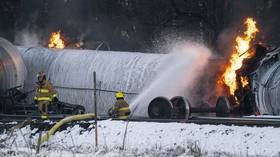Are we about to face rise in ECO-TERRORISM once Covid-19 pandemic is over?

Amid post-Covid-19 economic recovery, the risk of climate-activist eco-terrorism is increasing, and with it the danger of political elites co-opting its motives to implement contentious “green” regulatory regimes.
As the world wrestled with Covid-19 in 2020, another sinister crisis, years in the making, was erupting beneath the radar. That crisis is eco-terrorism. Having been around for decades, ever since ex-Greenpeace activists began attacking commercial shipping vessels in the 1970s, eco-terrorism, in the FBI’s definition, is “the use or threatened use of violence of a criminal nature against innocent victims or property by an environmentally-oriented, subnational group for environmental-political reasons, or aimed at an audience beyond the target, often of a symbolic nature.”
A more recent focal point for eco-terrorist activity has involved groups of radical environmentalists attacking infrastructure serving the global oil industry. Such foul play was reportedly involved in the December 2020 derailment of a crude-oil train north of Seattle, as part of a wave of dozens of eco-terrorist attacks on crude-oil railway infrastructure gripping the State of Washington since the early part of that year.
The method apparently used in these incidents is to place a “shunt” device on the tracks that interferes with the low-level electrical current on the tracks, disrupting a train’s safety features and causing it to derail.
The US Justice Department has been placing blame for these eco-terrorist attacks on left-wing anarchist groups. After a string of shunting incidents in Washington in January 2020, the Puget Sound Anarchists took responsibility for the attacks, stating on the website itsgoingdown.org “that the shunting activity was carried out in solidarity with Native American tribes in Canada seeking to prevent the construction of an oil pipeline across British Columbia, and with the express goal of disrupting BNSF [Railway] operations and supplies for the pipeline,” according to a criminal complaint eventually filed by the Justice Department in November 2020.
The nearly 1,200-mile Dakota Access Pipeline, transiting the Dakotas, Iowa and Illinois, has seen a similar running battle erupt between oil-pipeline development and radical environmentalists, with pipeline developer Energy Transfer having sued Greenpeace in 2017 over directing “rogue eco-terrorist groups” in a protest campaign that allegedly raised the cost of construction by $300 million. One incident in 2016 saw hundreds of protesters spark a riot on project land in which shots were fired on police officers and vehicles burned. The pipeline, which had its construction halted under the Obama Administration but reopened and completed under President Donald Trump, is currently under environmental review by the Biden Administration.
Consciously or not, the eco-terrorists targeting oil infrastructure may be pawns in the pressure for a globalized carbon-regulatory system and its billions of dollars of potential revenue. That is the theory suggested by Roy Spencer, a climate scientist at the University of Alabama in Huntsville who dissents on the implications of increased carbon dioxide in the Earth’s atmosphere, whose like-minded colleague John Christy’s office was allegedly targeted by seven shots fired during a “March for Science” event on campus in 2017.
Lending credence to this viewpoint is the fact that the Puget Sound Anarchists claiming responsibility for the January 2020 shunting attacks take a vehemently climate-activist stance on what they view as human-caused global warming. In one article posted to its website, the argument is advanced that “Rapidly increasing ecological collapse and climate change brought on by the State’s mismanagement of ‘its’ resources and in cooperation with industrial capitalism’s overzealous exploitation of the land and sea have destabilized regions the world over and created climate refugees and destroyed communities.”
Yet these radical eco-terrorists are frequently portrayed in mainstream media outlets as, in some shape or form, noble crusaders forced down the path of violence by an evil conservative juggernaut – embodied by the recent Trump Administration – that refuses to recognize the supposedly unassailable theory of human-caused climate change via fossil-fuel burning.
That is a dangerous generalization on several counts. There is a body of scientific evidence that casts doubt on the claims of anthropogenic climate change.
So-called “clean energy” – supposedly the Shangri-La taking us away from dirty fuels into environmentally-friendly electricity generation from source to user – is a slick exterior that conceals a profoundly toxic truth. Clean power installations including those used for solar and wind energy, along with electric-vehicle batteries, rely heavily on components made of rare-earth metals, which are mined and processed via high-pollution methods and solvents, often in countries with appalling working conditions. In the city of Baotou, China alone, thousands of tons of chemically treated, mined rare earth are reportedly deposited each year in a five-mile-wide artificial lake after neodymium has been extracted for wind turbines, many of which have been installed in the UK. The pollution has ruined farmland and endangered residents along with their water sources.
Also on rt.com My time with Extinction Rebellion activists showed them to be clueless about the daily injustices faced by working-class peopleWith global oil demand rising again and trade – including that in hydrocarbon-based fuels – quickening a year into the Covid-19 pandemic, the risk of eco-terrorist incidents may be increasing too, as the radical environmentalists find new “motives” for attacks. But the motives may be less important than the implications.
The real harm from eco-terrorism is how mainstream “progressive” establishment circles portray the terrorists, as quasi-sympathetic figures who are used as justification for burdensome regulatory regimes to address climate change. If the world would only address the supposedly existential threat of human-caused climate shifts by taxing consumers for their carbon-emitting energy consumption, as the theory implies, such eco-terrorists would become deradicalized and re-enter mainstream society. Already, these elites are gearing up to use any expedient pretext to make post-Covi-19 recovery more about costly and contentious regulatory regimes than coalescing and expanding that recovery’s economic gains.
The heavy guns of globalist dogma are fully deployed, trying to force a renewed effort for large-scale climate activism, due to the alleged interrelatedness between the coronavirus and climate change. Arthur Wyns, a climate change researcher at the World Health Organization (WHO), has written that “Well-resourced healthcare systems are essential to protect us from health security threats, including climate change.”
The Brookings Institution think tank is citing the economic gains of pandemic recovery in the developing nations of Africa as justification for taxing those gains to fund “green transformations” in a “recovery and sustainability program.”
To top it all, on Wednesday, US President Joe Biden remarked in an address to Air Force personnel in the UK that the US military Joint Chiefs of Staff have told him “the greatest physical threat facing America” is global warming allegedly caused by humans.
Also on rt.com Dutch court orders Shell to cut emissions, showing us who's in charge (Hint: It's not the people or their elected representatives)What this high-flying language does is provide an underhanded public platform for the radicalized, rather narrow-minded worldviews of climate activists who have become terrorists. What it denotes, in reality, is a system of taxation funneling money into unaccountable bureaucracies. Biden’s new post-Covid spending proposals are rife with carbon-regulatory measures and a rollback of Trump-era tax cuts, and though they do not explicitly delineate a “carbon tax,” the US president is apparently still open to the idea.
The right-wing Heritage Foundation has its own ideological ax to grind in the realm of direct and indirect carbon taxes, but it nonetheless hits closer to the mark in a report pointing out that a blanket carbon-taxation system would pummel individual consumers through increased energy costs passed onto them by big oil companies while destroying jobs, allowing for “an unprecedented expansion of the federal government while making Americans poorer and more dependent on Washington.”
Those who stand most to profit from “anarchist” and “environmentalist” terrorism against the oil industry, then, are not the on-the-ground perpetrators but the establishment figures who are subtly seeking to co-opt its message, using it to justify a bloated climate-activist regulatory regime. That path leads to an oppressive, oligopolistic system of unaccountable government and corporate cabals harming the economic positions of citizens and smaller companies.
Militantly attacking oil as evil while upholding the ephemera of climate activism as sacrosanct is a dangerous path, deflecting attention from the real problem of toxic pollution in the industries supplying the “clean” energy sector with its componentry. Attempting to divert the economic gains of post-pandemic recovery under the noble heading of environmental protection is a tactic of compulsion – one that distorts the cause of environmentalism when it so desperately needs honest critique.
Like this story? Share it with a friend!
The statements, views and opinions expressed in this column are solely those of the author and do not necessarily represent those of RT.













